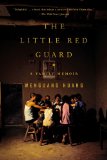Summary | Excerpt | Reviews | Beyond the Book | Readalikes | Genres & Themes | Author Bio

A Family Memoir
by Wenguang Huang1 .
Demands
At the age of ten, I slept next to a coffin that Father had
made for Grandma's seventy-third birthday. He forbade
us from calling it a "coffin" and insisted that we refer to
it as shou mu, which means something like "longevity wood." To
me, it seemed a strange name for the box in which we'd bury
Grandma, but it served a practical purpose. It was less spooky
to share my room with a "longevity wood" than with a big black
coffin.
In 1973, Grandma had turned seventy-one, or seventy-two
by the Chinese counting in which you are already one at birth.
All of a sudden, she became obsessed with death and was scared.
My sister, Wenxia, and I still remember the night when Grandma
first broached the topic. Over dinner, Mother had launched into
her usual tirade over household chores. She had visited a neighbor's
house the night before and seen how their eldest son willingly
pitched in to wash dishes after dinner. "He polished the stove
squeaky clean," Mother said, looking at the four of us. "Too bad
I have given birth to a bunch of lazybones." We all hunched over
our bowls silently. Grandma, impatient with Mother's whining
about mundane household tasks, announced that she might die
soon.
It never occurred to us children that Grandma would die
someday. Ever since I could remember, she had seemed old, with
wrinkles and brownish age spots on her face.
Father put down his chopsticks, looking startled and concerned.
"Are you feeling sick?"
"Not... yet."
Mother couldn't resist. "What do you mean by that?"
It turned out her fear was based on the old Chinese adage,
"When a person reaches the ages of seventy-three or eighty-four,
the King of Hell is most likely to make his call." Considering
that she had only one year to reach that first threshold, Grandma
wanted to be ready. She asked Father to start planning her funeral.
Following her death, Grandma wanted to be buried in her native
village in Henan Province, next to my late grandpa.
Annoyed that she had been upstaged by Grandma, Mother left
the table. Father looked relieved that his mother wasn't suffering
from some serious physical ailment. "Don't start imagining
things," he said. "It's a new society now and people no longer
believe in those superstitious sayings." He picked up his chopsticks
and went back to slurping his noodles.
Grandma never went to school, but she had a library full of sayings
in her head and dispensed them freely. A few months before,
a neighbor was planning a small banquet at home to celebrate her
father's upcoming fiftieth birthday. She came to Grandma to seek
advice on a proper gift for her father, but ended up getting an earful
on why she should give up on the plan. "Back in our village,
people never celebrated their birthdays before they turned sixty,"
she said, and backed up her point with a Chinese saying, "Enjoying
a banquet of meat and drink at sixty, one's life would never cease."
Grandma warned that making a fuss over one's birth days too early
could harm longevity. Our young neighbor nodded gratefully.
When I heard the story, I asked Grandma to explain the science
behind it. She brushed me off . "If it has been passed down
from generation to generation, it has to be true," she told me. In
later years, I was surprised to hear friends who grew up in different
parts of the country repeat a similar saying about celebrating
birthdays at sixty, echoing what Grandma had said to our young
neighbor.
We thought Grandma's new obsession with death was a phase
and she would snap out of it soon, but as the cold, dark winter
approached, she began to sleep less and less and the subject
seemed to linger on the edge of every conversation. Oftentimes,
Grandma would pretend to chat with me and my siblings
at dinner, but we all knew she meant for my parents, especially
Father, to hear. She said people in her native village were very
particular about burials - the location and maintenance of yinzhai, or residences of the dead, were believed to be critical to the well-being of the future generations. In addition, people spent extravagantly on funerals because it was considered an ultimate
expression of filial duty. Grandma then recounted the story of a
virtuous young woman in a poor family near her village, kneeling
on the street and offering to sell her body so she could collect
money to give her deceased father a proper burial.
Reprinted by arrangement with Riverhead, a member of Penguin Group (USA) Inc., from The Little Red Guard: A Family Memoir by Wenguang Huang Copyright © 2012 by Wenguang Huang
It was one of the worst speeches I ever heard ... when a simple apology was all that was required.
Click Here to find out who said this, as well as discovering other famous literary quotes!
Your guide toexceptional books
BookBrowse seeks out and recommends the best in contemporary fiction and nonfiction—books that not only engage and entertain but also deepen our understanding of ourselves and the world around us.